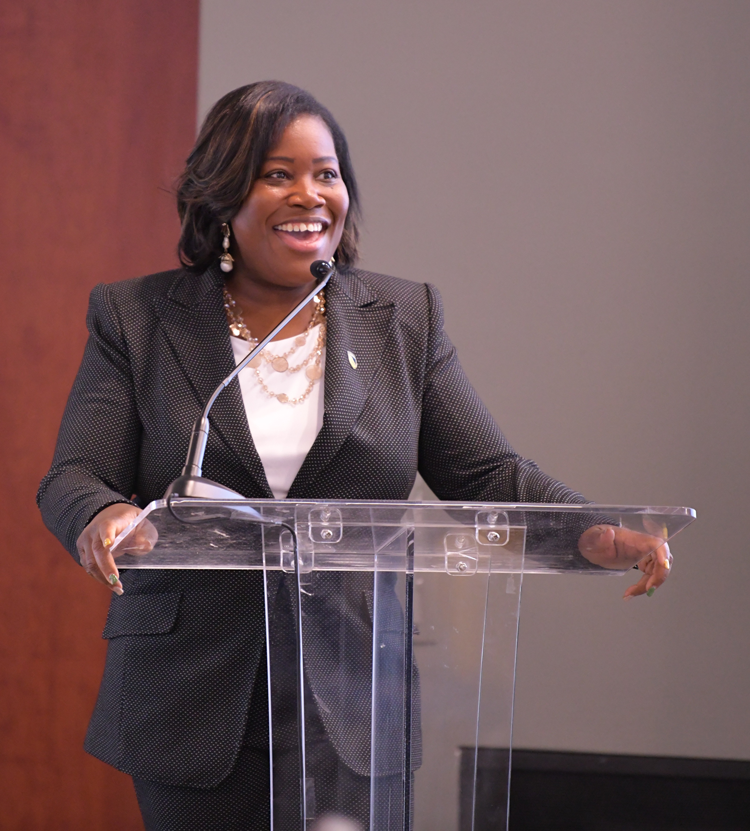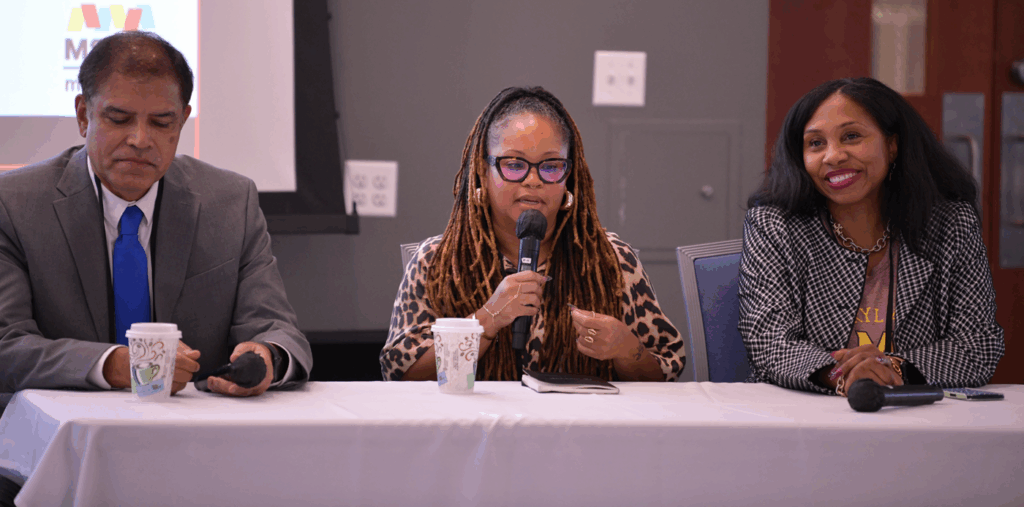By Amanda Tan, Associate Director, MS-CC Research Development
The MS-CC recently brought together faculty, researchers, and IT leaders from Historically Black Colleges and Universities (HBCUs) at Coppin State University in Baltimore, Md. The two-day workshop (Sept. 30 – Oct. 1, 2025) explored the intersection of artificial intelligence, academic integrity, and advanced cyberinfrastructure development.
Dr. Dionne Curbeam, vice president of technology and CIO at Coppin State, delivered perhaps the workshop’s most memorable moment, urging participants to move from endless policy discussions to concrete action. “We pontificate, we politicize, we politicize, and all the time we’re doing this, the world is passing us by,” she said.
While acknowledging the importance of frameworks and values, she emphasized that HBCUs risk educational malpractice by remaining analog, whereas the rest of the world is transitioning to digital. Her message resonated with workshop attendees: balance policy development with parallel action.

Finding Balance in the AI Era
Throughout the workshop, one question dominated the discussions: How can HBCUs effectively utilize AI as a transformative educational tool while ensuring it enhances, rather than replaces, student learning. Participants from multiple institutions grappled with this challenge, acknowledging that students have often adopted AI more readily than faculty. Institutions should collaborate with students on AI integration rather than simply restricting its use.
Several groups drew parallels to past technological disruptions. One mathematics professor recalled debates about calculators decades ago, when educators worried the devices would prevent students from developing critical thinking skills. The lesson, participants agreed, is that technology integration requires both adaptation and thoughtful implementation rather than resistance driven by fear.
Collaborating for the Better
Participants repeatedly returned to a fundamental reality: HBCUs and smaller campuses face the same compliance burdens and educational challenges as large R1 institutions but with fewer resources. This makes collaboration essential. Thus, MS-CC’s role in convening stakeholders across institutions to develop shared best practices, collect experiences with AI implementation, and create knowledge-sharing platforms is even more critical.
The workshop highlighted the diverse approaches to AI across different disciplines. What constitutes academic integrity in environmental science research may differ from expectations in mathematics or English composition. Rather than seeking universal answers, participants focused on identifying common challenges and building frameworks flexible enough to accommodate disciplinary differences.
As Elizabeth State University’s Dr. Feseha Abebe-Akele observed, “The MS-CC workshop at Coppin State University was especially valuable because it was structured to ensure that every participant was an active contributor.”
Next Steps
Workshop participants developed concrete recommendations for moving forward. They look forward to working with MS-CC to facilitate communities of practice, synthesize discussions into white papers, and support regional research corridors connecting HBCUs. Participants also expressed interest in accessing national advanced cyberinfrastructure resources, including academic supercomputers, cloud platforms like Jetstream2, and specialized computational tools. For institutions, priorities include establishing clear AI policies, investing in faculty development, and breaking down silos between departments. Individual faculty members are committed to experimenting with AI integration, documenting results, and participating in MS-CC’s cybersecurity and CI planning communities of practice.
Participant feedback reflected the workshop’s success. Attendees particularly valued networking opportunities, lightning talks showcasing existing cyberinfrastructure applications, and the tour of Coppin’s state-of-the-art nanotechnology center.
“As a panelist, I had the opportunity to share Lincoln University’s experiences with cyberinfrastructure and faculty-IT relationships on our campus,” observed Dr. Tiffany Davis, an assistant professor and library director at Lincoln. “The engaging discussion allowed academic professionals to connect, exchange innovative ideas, and discover new possibilities for collaboration.”

Workshop panelists from left to right: Drs. Naveed Zaman, Tiffany Davis, and Ebony Terrell Shockley
Looking Ahead and Special Thanks
The workshop demonstrated both the urgency HBCUs feel about advancing their AI and cyberinfrastructure capabilities and their determination to do so collaboratively. As one participant noted, the greatest value lies not just in immediate discussions but in “the collaborative workshop and the future white paper that will result from it.”
MS-CC continues to play a critical role in providing forums for collaboration, facilitating access to national resources and building sustainable communities of practice across HBCUs and TCUs.. MS-CC extends gratitude to Dr. Curbeam and the Coppin State University Division of Information Technology for hosting this workshop.
To view the presentations from the workshop, visit our web page.
About the MS-CC
The MS-CC supports minority-serving institutions in advancing their cyberinfrastructure capabilities through training, resources, and collaborative networks. Learn more at ms-cc.org.
